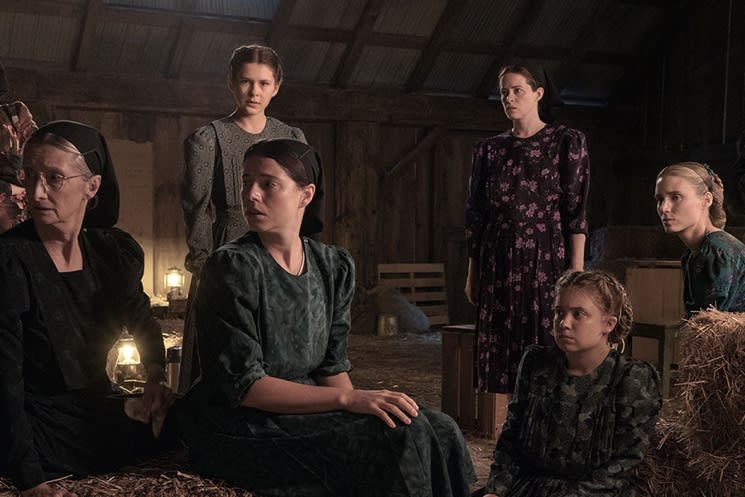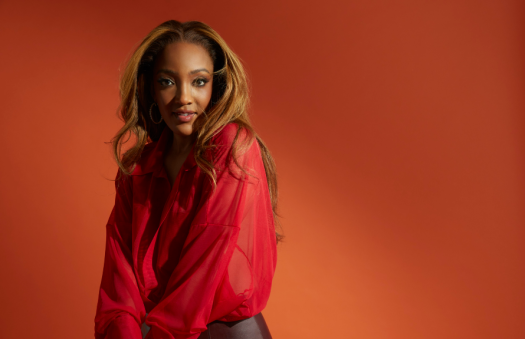The following article contains potentially triggering material relating to sexual assault and violence. If you believe you have experienced or witnessed sexual misconduct and are looking for support, consult the Canadian Resource Centre for Victims of Crime to find resources in your area.
In 2011, nine men from the Manitoba Colony, a closed Mennonite community in Bolivia, were charged and imprisoned for drugging and raping over 100 women between 2005 and 2009. Women and girls woke up in pain amid blood soaked sheets with no memory of how this occurred. Initially, they were convinced that this was the work of demons, until two men were caught sneaking into a house in the middle of the night. It was soon discovered that a group of men from the colony were using animal tranquilizers to sedate women and girls, some as young as 3 years old, in their sleep before assaulting them.
Canadian author Miriam Toews loosely based her novel, Women Talking, around these horrific events, creating a fictionalized meeting of eight Mennonite women deciding what the women of the colony should do next. Writer-director Sarah Polley has now adapted Toews' book into a film set primarily in the hayloft where this meeting occurs.
Polley's film begins with Salome (Claire Foy) attacking a man with a scythe upon learning that her four-year-old daughter was sexually assaulted the night before. The men of the colony are arrested by the police "for their own protection" and sent into the city to pay their bail. While the men are away, the women hold a vote to decide what they wish to do: stay and fight, leave, or do nothing. After the votes are tabulated, a select group of women stay behind to discuss the fate of their community.
In addition to Salome, other women present at the meeting include Ona (Rooney Mara), a young single woman who has been impregnated by her rapist; Mariche (Jessie Buckley), a wife and mother of two young daughters whose husband beats and rapes her; and two of the community elders, Agata (Judith Ivey) and Greta (Sheila McCarthy). Over the course of one evening, these women have philosophical debates surrounding their three options, incorporating religious consequences, economic considerations and general practicality (since living in such a community has rendered these women illiterate and seemingly dependent on men).
To say that Women Talking is a heavy movie is an understatement. What these women have endured is gruesome and cruel, and the film highlights the internal conflict many women in abusive relationships wrestle with. Women Talking could have been rich with nuanced examinations of gender roles, religion and cultural and societal blame. Instead, the film rehashes the same talking points that blogs, thinkpieces in The New Yorker and Reddit forums have been raising since before the #MeToo movement began.
Given Polley's casting choices, any complexities concerning race are lost, and so religion remains the most significant consideration. The women believe that leaving will cause God to judge them as unforgiving, preventing them from entering heaven. One young woman, Mejal (Michelle McLeod), raises the point that, even if they stay, they must truly forgive the men in order for God to deem them worthy, and are they really willing to forgive? It's one of the few interesting questions asked that elicits no response and ultimately goes nowhere.
Polley is an immensely talented filmmaker and writer who has equipped herself with a stunning cast who all deliver strong performances. But Women Talking doesn't offer anything new to the conversation, resulting in dialogue that anyone who has a remote interest in the topic is familiar with and could predict. And anyone who, for whatever heinous reason, finds themselves on the other side of that debate, will be unchanged, and, realistically, won't even watch the film.
From a filmmaking perspective, Women Talking is a very well-made. Polley's direction, the ensemble's performance, the costumes and production design are all executed perfectly. There are some narrative leaps of faith required of viewers, but those gaps can and should be overlooked given the subject matter; for instance, it's arguable that a group of uneducated women in an ultraconservative and closed community wouldn't be having such a philosophical debate to begin with. Also, in life, there are many moments when a singalong is appropriate, but given the pressing nature of their situation, maybe breaking out into hymn isn't a good use of their time.
It goes without saying that what is discussed in the film is important. But when the rebuttal raised consistently throughout the film is, "We and our children are not safe here," the film becomes a tad one-note. When Polley does add in some modern texture — the "not all men" discourse and a thinly written transgender character — it feels tacked on and performative to ensure all bases are covered. For a conversation that could go in so many worthwhile directions, it's disappointing that Polley chose the same well-worn one.
It's also worth mentioning that the women of the Manitoba Colony did not leave. The survivors of the attacks weren't offered any counselling or support. The only change to occur were steel doors and bolts, and by all accounts, even after the group of nine men were imprisoned, the rapes continued. But prominent leaders within the colony have insisted it's all behind them and there's no need to talk about it any further.
(Universal)In 2011, nine men from the Manitoba Colony, a closed Mennonite community in Bolivia, were charged and imprisoned for drugging and raping over 100 women between 2005 and 2009. Women and girls woke up in pain amid blood soaked sheets with no memory of how this occurred. Initially, they were convinced that this was the work of demons, until two men were caught sneaking into a house in the middle of the night. It was soon discovered that a group of men from the colony were using animal tranquilizers to sedate women and girls, some as young as 3 years old, in their sleep before assaulting them.
Canadian author Miriam Toews loosely based her novel, Women Talking, around these horrific events, creating a fictionalized meeting of eight Mennonite women deciding what the women of the colony should do next. Writer-director Sarah Polley has now adapted Toews' book into a film set primarily in the hayloft where this meeting occurs.
Polley's film begins with Salome (Claire Foy) attacking a man with a scythe upon learning that her four-year-old daughter was sexually assaulted the night before. The men of the colony are arrested by the police "for their own protection" and sent into the city to pay their bail. While the men are away, the women hold a vote to decide what they wish to do: stay and fight, leave, or do nothing. After the votes are tabulated, a select group of women stay behind to discuss the fate of their community.
In addition to Salome, other women present at the meeting include Ona (Rooney Mara), a young single woman who has been impregnated by her rapist; Mariche (Jessie Buckley), a wife and mother of two young daughters whose husband beats and rapes her; and two of the community elders, Agata (Judith Ivey) and Greta (Sheila McCarthy). Over the course of one evening, these women have philosophical debates surrounding their three options, incorporating religious consequences, economic considerations and general practicality (since living in such a community has rendered these women illiterate and seemingly dependent on men).
To say that Women Talking is a heavy movie is an understatement. What these women have endured is gruesome and cruel, and the film highlights the internal conflict many women in abusive relationships wrestle with. Women Talking could have been rich with nuanced examinations of gender roles, religion and cultural and societal blame. Instead, the film rehashes the same talking points that blogs, thinkpieces in The New Yorker and Reddit forums have been raising since before the #MeToo movement began.
Given Polley's casting choices, any complexities concerning race are lost, and so religion remains the most significant consideration. The women believe that leaving will cause God to judge them as unforgiving, preventing them from entering heaven. One young woman, Mejal (Michelle McLeod), raises the point that, even if they stay, they must truly forgive the men in order for God to deem them worthy, and are they really willing to forgive? It's one of the few interesting questions asked that elicits no response and ultimately goes nowhere.
Polley is an immensely talented filmmaker and writer who has equipped herself with a stunning cast who all deliver strong performances. But Women Talking doesn't offer anything new to the conversation, resulting in dialogue that anyone who has a remote interest in the topic is familiar with and could predict. And anyone who, for whatever heinous reason, finds themselves on the other side of that debate, will be unchanged, and, realistically, won't even watch the film.
From a filmmaking perspective, Women Talking is a very well-made. Polley's direction, the ensemble's performance, the costumes and production design are all executed perfectly. There are some narrative leaps of faith required of viewers, but those gaps can and should be overlooked given the subject matter; for instance, it's arguable that a group of uneducated women in an ultraconservative and closed community wouldn't be having such a philosophical debate to begin with. Also, in life, there are many moments when a singalong is appropriate, but given the pressing nature of their situation, maybe breaking out into hymn isn't a good use of their time.
It goes without saying that what is discussed in the film is important. But when the rebuttal raised consistently throughout the film is, "We and our children are not safe here," the film becomes a tad one-note. When Polley does add in some modern texture — the "not all men" discourse and a thinly written transgender character — it feels tacked on and performative to ensure all bases are covered. For a conversation that could go in so many worthwhile directions, it's disappointing that Polley chose the same well-worn one.
It's also worth mentioning that the women of the Manitoba Colony did not leave. The survivors of the attacks weren't offered any counselling or support. The only change to occur were steel doors and bolts, and by all accounts, even after the group of nine men were imprisoned, the rapes continued. But prominent leaders within the colony have insisted it's all behind them and there's no need to talk about it any further.




